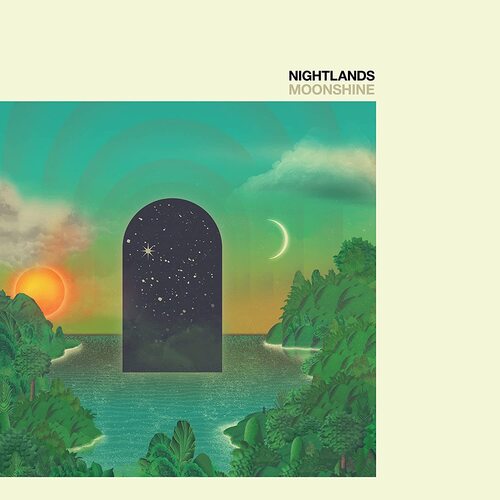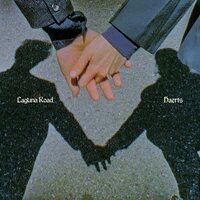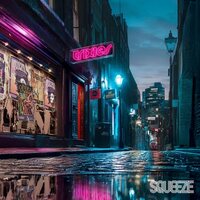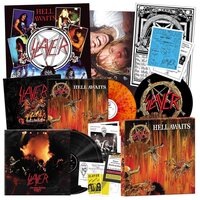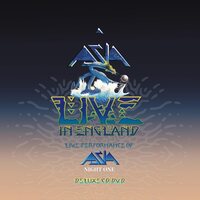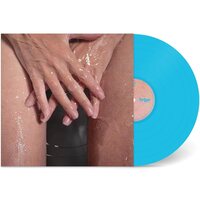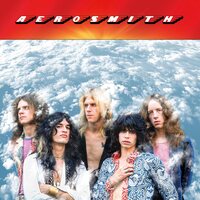Amid massive global paradigm shifts Dave Hartley (aka Nightlands) became a father twice over and left his native Philadelphia for Asheville, where the pace of daily life is slower and it's easier to maintain a zoomed-out perspective on modern life. From the newfound refuge of a studio he built using the bones of a barn attached to his hundred-something-year-old house in the mountains, Hartley has tailored a collection of well-crafted pop rock, pointedly titled Moonshine. Guided by some of the harmonic sensibilities that have helped make The War on Drugs a force in modern music, Moonshine combines immaculate-yet-dense vocal stacks and billowy clouds of effected keyboards with classic songcraft, revealing previously unseen acreage in the unfurling dreamscape that is Nightlands. The surrealistic album art by Austin-based illustrator Jaime Zuverza depicts an archway opening to the stars over the surface of an idyllic sea flanked by both moon and sun. Similarly, Moonshine reveals portals within portals leading to ever deeper places in Hartley's vocal-centered labyrinth. Throughout the album, there are plenty of buoyant high moods where the pitter-patter of drum machine and humming digital organ hints at Hartley's low-key tropicalia streak, but the lyrics anchor the dreaminess in real-world sorrow and resignation. Nowhere are these sentiments more apparent than on the title track, a nearly acapella recitation of "America the Beautiful" that poignantly hovers over a mirage of soft keyboards before dovetailing into Hartley's own words about the hypocrisy of the American dream. "This was never intended to be an overtly political record" he admits. "I have so many friends who are able to process the frustration of current events gracefully or with wisdom or in a nuanced way, but I often find myself just consumed with anger about it all. I decided to just let that come out, and it manifested itself lyrically." Moonshine's wide-eyed, utopian instrumental backdrops provide sharp contrast to Hartley's lyrics, which sting even harder within the sweetness. Even in light of the album's vocal emphasis, Hartley's history as a bassist brilliantly beams through Moonshine, giving effortless and sprightly movement to songs like "Down Here," which also features an extended section of saxophone lent by his Western Vinyl labelmate, Joseph Shabason. In addition to Shabason, the album hosts a short list of remote collaborators including four of Hartley's bandmates from The War on Drugs, Robbie Bennet, Anthony Lamarca, Eliza Hardy Jones, and Charlie Hall, as well as exotica virtuoso Frank Locrasto (Cass McCombs, Fruit Bats), and producer Adam McDaniel (Avey Tare, Angel Olsen). Hartley was forced to keep the guest list small out of the necessity of pandemic isolation, coupled with his move to a smaller city, all of which challenged him to do most of the album's heavy lifting right down to the mixing duties, resulting in the most independent effort of his career. By that measure, Moonshine is also the clearest image yet of Dave Hartley as a person and creator.
Release date:
July 15, 2022
Label:
Install our app to receive notifications when new upcoming releases are added.

Recommended equipment and accessories
-

Nagaoka MP-110H Cartridge
Features a high-quality elliptical stylus that provides excellent tracking and minimizes distortion, delivering a detailed sound reproduction with an output voltage of 5.0 mV
-

Denon DP-400
Featuring a high-precision, belt-driven mechanism and an adjustable tonearm that ensures optimal tracking and minimal resonance
-

Phono Preamps - Top Picks
A selection of the best phono preamps for your turntable setup
-

Edifier R1280DB Powered Speakers
Combining classic design with modern Bluetooth connectivity, built-in amplification and versatile inputs, these speakers deliver rich, balanced sound.
-
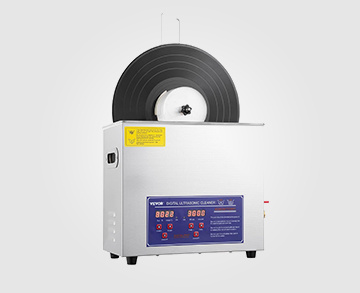
Vevor Ultrasonic Cleaner
Thoroughly clean and restore your vinyl records, removing dust, dirt, and grime from every groove without damaging the surface
Featured Upcoming Vinyl
-

Haerts Laguna Road [50xLP]
Haerts
March 13, 2026 -

Squeeze Trixies
Bmg
March 6, 2026 -

Kisschasy Terrors Of Comfort
Unified Music Group
February 20, 2026 -

Slayer Hell Awaits [3xLP]
Metal Blade
May 15, 2026 -

The Messthetics/James Brandon Lewis Deface The Currency
Impulse
February 20, 2026 -

Cannibal Corpse Chaos Horrific (Uk Exclusive)
Metal Blade Import
February 27, 2026 -

Asia Live In London [2xLP]
Frontiers New Recordings Physical Only
March 13, 2026 -

Peaches No Lube So Rude (Blue)
Kill Rock Stars
February 20, 2026 -

Iron & Wine Hen's Teeth (Amazon Exclusive)
Sub Pop
February 27, 2026 -

Malevolent Creation 13th Beast
Back On Black
March 20, 2026 -

Drake Milligan Tumbleweed (Custard)
Bmg
March 13, 2026 -

Aerosmith Aerosmith (Legendary Edition Deluxe) [4xLP]
Capitol
March 20, 2026 -

Souled American Sanctions (Clear)
Jealous Butcher Records
April 17, 2026 -

RAYE This Music May Contain Hope [2xLP]
Human Re Sources
March 27, 2026
